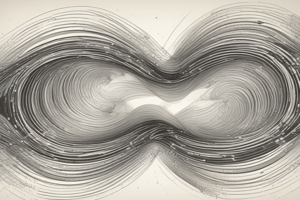Podcast
Questions and Answers
The double-slit experiment demonstrates that light and matter can satisfy the classical definitions for both waves and particles. This is evidence for the fundamentally probabilistic nature of which branch of physics?
The double-slit experiment demonstrates that light and matter can satisfy the classical definitions for both waves and particles. This is evidence for the fundamentally probabilistic nature of which branch of physics?
- Classical physics
- Modern physics
- Wave-particle duality
- Quantum mechanics (correct)
Who first performed the double-slit experiment using visible light?
Who first performed the double-slit experiment using visible light?
- Alexander Reid
- Davisson and Germer
- Thomas Young (correct)
- George Paget Thomson
What was the initial belief about the nature of light in Thomas Young's time?
What was the initial belief about the nature of light in Thomas Young's time?
- Light had no definite nature
- Light was a combination of waves and particles (correct)
- Light consisted only of particles
- Light consisted only of waves
Who demonstrated that electrons also exhibit wave-particle behavior?
Who demonstrated that electrons also exhibit wave-particle behavior?
Which branch of physics did the concept of wave-particle duality belong to?
Which branch of physics did the concept of wave-particle duality belong to?
Flashcards are hidden until you start studying
Study Notes
Double-Slit Experiment
- Demonstrates that light and matter exhibit characteristics of both waves and particles.
- Provides evidence for the probabilistic nature of quantum mechanics.
Historical Context
- Thomas Young first performed the double-slit experiment using visible light in 1801.
- During Young's era, the prevailing belief was that light was strictly a particle.
Wave-Particle Duality
- The concept of wave-particle duality is central to quantum mechanics.
- Electrons were later shown to exhibit wave-particle behavior, expanding the principle beyond light.
Quantum Mechanics
- Explores the dual nature of particles, challenging classical physics notions.
- Highlights the significance of probability in explaining physical phenomena at the quantum level.
Studying That Suits You
Use AI to generate personalized quizzes and flashcards to suit your learning preferences.




